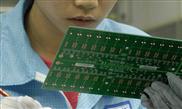
Workers make chips at Anhui Dongke Semiconductor Co in East China's Anhui Province on Saturday. The company is located in the Anhui Ma'anshan Economic and Technological Development Zone, and it is mainly engaged in the design, production and sales of green power chips. Photo: VCG
Chinese chipmakers are reportedly prioritizing orders from domestic clients while turning down orders from abroad as part of a necessary shift to embrace growing market opportunities at home.
Some large industry players, including Huahong Group, have reportedly cancelled overseas orders to give priority to domestic companies, as global chip supplies fall short.
Chinese chipmaking giant Semiconductor Manufacturing International Corp (SMIC) has also established the strategy of taking orders mainly from local customers, according to media reports.
A person in the press department of SMIC said "he was not aware of the situation" when reached by the Global Times on Tuesday, and the Huahong Group could not be reached for comment as of press time.
However, the reported trend has captured the attention of industry representatives.
A source from an industry body, who declined to give details because he was not authorized to discuss the matter, confirmed to the Global Times on Tuesday that it had noticed the new trend and attached great importance to it, and was looking into the matter.
Since the beginning of this year, the global semiconductor chip shortage has intensified due to multiple factors, including the rebound of the automobile industry and the popularization of 5G technology.
Experts said that when global wafer production capacity is insufficient, companies often have to decide whose orders to fill.
"Channeling limited production capacity to meet the demand of domestic buyers may cause some loss of interest among foreign clients in the short term. But in the long run, it can support local chip manufacturers and lead to long-term, stable orders," Luffy Lin, chief analyst at Witdisplay, an electronics device consulting platform, told the Global Times on Tuesday.
If domestic chipmakers give capacity to overseas clients, they may not necessarily get adequate orders when there are no shortages in the future, said Lin, noting that allocating the capacity to local chip designers will help them grow quickly amid a growing trend of domestic substitution.
With the strengthening of external restrictions, particularly from the US, a volatile international economic and trade situation, and global pandemic disruptions, localization will become the long-term development trend of the semiconductor industry both in China and overseas, industry insiders said.
A market director with a large chip producer based in East China's Jiangsu Province surnamed Wang told the Global Times on Tuesday that new orders can't be filled for at least seven or eight weeks, and that may not change soon, given the resilient demand.
Although the company won't necessarily favor domestic clients, it will prioritize orders from clients with which it has strategic and long-term partnerships, and domestic clients make up most of the cases.
"With rising opportunities amid a call to use domestic wafer substitutes, we will put more focus on building domestic partnerships for reliable, sustainable growth," said Wang.
Wang said that 60-70 percent of the clients are domestic companies and there will be more.
China's integrated circuit (IC) market exceeded $143.4 billion in 2020, accounting for 36.24 percent of the global market, while domestic ICs accounted for less than 20 percent, statistics from IC Insight showed.
China is the world's largest consumer of semiconductors, but there is a big gap between local IC production capacity and semiconductor supply, Qiu Kai, a researcher of Huashang Fund said, indicating broad scope for the localization of the chip sector.



